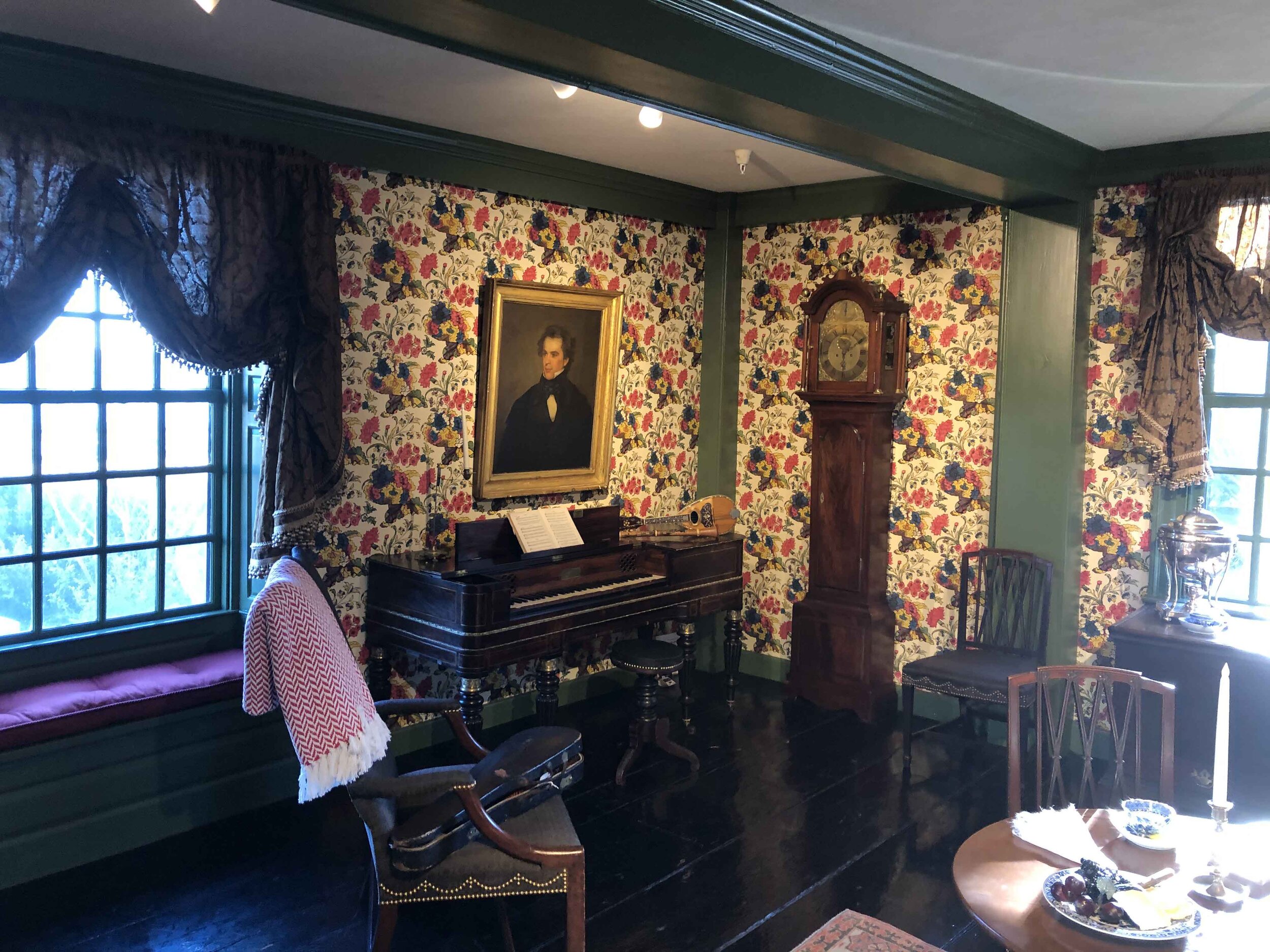Table Of Content

These pictured people were odd humorists,in a world of their own,—a world of vivid brilliancy, so far as colorwent, and still unfaded, although the teapot and small cups were as ancient asthe custom itself of tea-drinking. But here the shop-bell rang; it was like a sound from a remotedistance,—so far had Hepzibah descended into the sepulchral depths of herreminiscences. On entering the shop, she found an old man there, a humbleresident of Pyncheon Street, and whom, for a great many years past, she hadsuffered to be a kind of familiar of the house. He was an immemorial personage,who seemed always to have had a white head and wrinkles, and never to havepossessed but a single tooth, and that a half-decayed one, in the front of theupper jaw.
Episode 73: The House of the Seven Gables, by Nathaniel Hawthorne - National Review
Episode 73: The House of the Seven Gables, by Nathaniel Hawthorne.
Posted: Tue, 05 Mar 2019 08:00:00 GMT [source]
VIII: The Pyncheon of To-Day
He weakly greets Phoebe, and Hepzibah explains that Phoebe is their cousin. The three sit down to eat, and Clifford notices how changed Hepzibah is and wonders if she is angry with him because of her scowl. He eats voraciously as the narrator continues to describe his disposition toward all that is beautiful. He is pleased with Phoebe's presence but cannot look at his sister because of her unattractiveness. Clifford enjoys the beautiful rose presented by Phoebe and remarks about the dismal house. When the shop-bell rings, Phoebe gets up to attend to the customer, and Hepzibah explains to her brother that they are now quite poor.
Governor Pyncheon
It was like the heavy mass of clouds which we may often seeobscuring the sky, and making a gray twilight everywhere, until, towardsnightfall, it yields temporarily to a glimpse of sunshine. But, always, theenvious cloud strives to gather again across the streak of celestial azure. Without giving herself time for a second thought, she rushed into the shop,pale, wild, desperate in gesture and expression, scowling portentously, andlooking far better qualified to do fierce battle with a housebreaker than tostand smiling behind the counter, bartering small wares for a copperrecompense. Any ordinary customer, indeed, would have turned his back and fled.And yet there was nothing fierce in Hepzibah’s poor old heart; nor hadshe, at the moment, a single bitter thought against the world at large, or oneindividual man or woman. She wished them all well, but wished, too, that sheherself were done with them, and in her quiet grave.
Clifford Pyncheon
The testimony inregard to her scowl was frightfully important; it seemed to hold up her imagewholly relieved from the false light of her self-partialities, and so hideousthat she dared not look at it. She was absurdly hurt, moreover, by the slightand idle effect that her setting up shop—an event of such breathlessinterest to herself—appeared to have upon the public, of which these twomen were the nearest representatives. A glance; a passing word or two; a coarselaugh; and she was doubtless forgotten before they turned the corner. Theycared nothing for her dignity, and just as little for her degradation. Then,also, the augury of ill-success, uttered from the sure wisdom of experience,fell upon her half-dead hope like a clod into a grave.
Storyline

It was he, you know, of whom it used to be said, in reference to hisogre-like appetite, that his Creator made him a great animal, but that thedinner-hour made him a great beast. Persons of his large sensual endowmentsmust claim indulgence, at their feeding-time. The guests are warm and merry; they have given up the Judge; and,concluding that the Free-Soilers have him, they will fix upon anothercandidate. Were our friend now to stalk in among them, with that wide-openstare, at once wild and stolid, his ungenial presence would be apt to changetheir cheer. Neither would it be seemly in Judge Pyncheon, generally soscrupulous in his attire, to show himself at a dinner-table with that crimsonstain upon his shirt-bosom. It is an ugly sight,at any rate; and the wisest way for the Judge is to button his coat closelyover his breast, and, taking his horse and chaise from the livery stable, tomake all speed to his own house.
It fronted towards the east, so that at avery seasonable hour a glow of crimson light came flooding through the window,and bathed the dingy ceiling and paper-hangings in its own hue. There werecurtains to Phœbe’s bed; a dark, antique canopy, and ponderous festoonsof a stuff which had been rich, and even magnificent, in its time; but whichnow brooded over the girl like a cloud, making a night in that one corner,while elsewhere it was beginning to be day. The morning light, however, soonstole into the aperture at the foot of the bed, betwixt those faded curtains.Finding the new guest there,—with a bloom on her cheeks like themorning’s own, and a gentle stir of departing slumber in her limbs, aswhen an early breeze moves the foliage,—the dawn kissed her brow. It wasthe caress which a dewy maiden—such as the Dawn is,immortally—gives to her sleeping sister, partly from the impulse ofirresistible fondness, and partly as a pretty hint that it is time now tounclose her eyes. At this price, or at whatever price, she rejoiced that the day had reached itsend.
Hawthorne's Shadow Audio Tour
While the elderly gentleman stood looking at the Pyncheon House, both the frownand the smile passed successively over his countenance. His eye rested on theshop-window, and putting up a pair of gold-bowed spectacles, which he held inhis hand, he minutely surveyed Hepzibah’s little arrangement of toys andcommodities. At first it seemed not to please him,—nay, to cause himexceeding displeasure,—and yet, the very next moment, he smiled. Whilethe latter expression was yet on his lips, he caught a glimpse of Hepzibah, whohad involuntarily bent forward to the window; and then the smile changed fromacrid and disagreeable to the sunniest complacency and benevolence. He bowed,with a happy mixture of dignity and courteous kindliness, and pursued his way.
The Pyncheon of To-day
He would have made a good and massive portrait; better now,perhaps, than at any previous period of his life, although his look might growpositively harsh in the process of being fixed upon the canvas. The artistwould have found it desirable to study his face, and prove its capacity forvaried expression; to darken it with a frown,—to kindle it up with asmile. Her introductory day of shop-keeping did not run on, however, without many andserious interruptions of this mood of cheerful vigor. As a general rule,Providence seldom vouchsafes to mortals any more than just that degree ofencouragement which suffices to keep them at a reasonably full exertion oftheir powers. In the case of our old gentlewoman, after the excitement of neweffort had subsided, the despondency of her whole life threatened, ever andanon, to return.

Hepzibah considers the store a source of great shame, despite the comforting words of Uncle Venner, a neighborhood character, and of Holgrave, Hepzibah’s rebellious young lodger, who practices an early form of photography known as daguerreotypy. Hepzibah remains pessimistic, and though she tries her best, her scowling face continues to frighten customers. The very day that she opens her shop, Hepzibah receives a visit from Phoebe, a young girl who is Hepzibah’s cousin through an extended branch of the Pyncheon family.
Again, after a blankmoment, there would be a flickering taper-gleam in his eyeballs. It betokenedthat his spiritual part had returned, and was doing its best to kindle theheart’s household fire, and light up intellectual lamps in the dark andruinous mansion, where it was doomed to be a forlorn inhabitant. After arranging matters to her satisfaction, Phœbe emerged from her chamber,with a purpose to descend again into the garden. It was strewn aboutwith a few old books, and a work-basket, and a dusty writing-desk; and had, onone side, a large black article of furniture, of very strange appearance, whichthe old gentlewoman told Phœbe was a harpsichord. It looked more like a coffinthan anything else; and, indeed,—not having been played upon, or opened,for years,—there must have been a vast deal of dead music in it, stifledfor want of air.
Clifford Pyncheon is Hepzibah's brother and Judge Jaffrey Pyncheon's cousin. After being framed by his cousin for the murder of his uncle, Old Jaffrey Pyncheon, Clifford is imprisoned for thirty years. He returns to the House of the Seven Gables following his imprisonment and is cared for by Hepzibah and Phoebe. Prior to his incarceration, Clifford is a man of privilege who enjoys all that is beautiful. This quality persists in him and is evident in his inability to look at his unattractive, scowling sister and his desire to quit the "dismal house" for finer accommodations in the South of France and Italy. He fancies Phoebe and seems to lose himself in the sensual undertaking of eating.
Old Jaffrey Pyncheon believed that "Matthew Maule, the wizard, had been wronged out of his homestead, if not out of his life," and intended "to make restitution to Maule's posterity" before his death, but was unable to do so. Alice Pyncheon is the daughter of Gervayse Pyncheon, the granddaughter of Colonel Pyncheon, and Phoebe's great-great-grand-aunt. Hepzibah describes her as "exceedingly beautiful and accomplished." Alice is hypnotized by the younger Matthew Maule and forced to act in embarrassing and humiliating ways, including waiting on his bride.
As Hepzibah considers the possibility of failure, the shop-bell rings and a boy (Ned Higgins) enters. As with Holgrave, Hepzibah gives the child a gingerbread cookie for free. He shortly returns to request another cookie, for which Hepzibah takes his payment. Other customers follow and in several cases, Hepzibah does not stock their needs. At the end of the day, she has a poor opinion of the temperament and manners of people who she sees as part of the lower classes. At the same time, after seeing a wealthy lady pass by, she wonders about the purpose of such a person.
Whether the Judge in any degree resembled him, the further progress ofour narrative may show. After partly closing the door, the child turned back, and mumbled something toPhœbe, which, as the whale was but half disposed of, she could not perfectlyunderstand. It was that wretched scowl which time and her near-sightedness,and the fret of inward discomfort, had rendered so habitual that any vehemenceof mood invariably evoked it. But at the indistinct murmur of his words herwhole face grew tender, and even lovely, with sorrowful affection; theharshness of her features disappeared, as it were, behind the warm and mistyglow.

No comments:
Post a Comment